#wadi makhrour
Explore tagged Tumblr posts
Photo
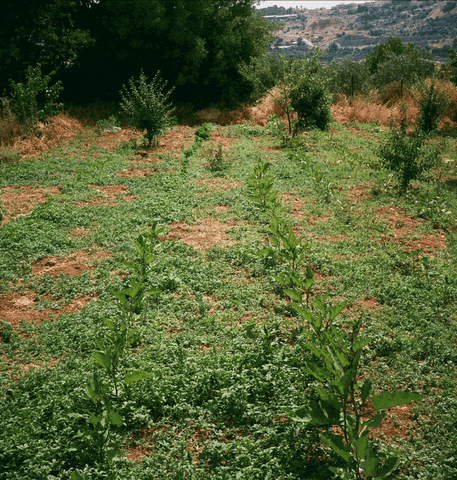
My dad and I work on this land. At the end of the story, it’s for the family, you know. We bought this land from a guy who went to Chile. He had a new life. His family left, so who’s going to take care of the land? Who for? The land here is not very expensive, because nobody knows what’s going to happen next. [But] what happens to us will happen to everyone who has land over here. It’s not going to come on me alone. So, as they say in Arabic, ‘put your heads together, and stay together’. If you’re going to sit at home and wait, you’ll be waiting a long time. A lot of people find gold in this town. They dig under the floor, under the houses. They thought it was the land of the gods, so they gave it as an offering. Or they hid it to keep it. And so many wars happened here, you know. When people went to fight in the war, they brought the gold with them. When they died, it stayed over here.
Many people find it when they start building. They found some gold at the church, crosses and stuff. They put it inside the church. I mean, we hear a lot of stories. But the story I told you, this is a true story about Beit Jala. When people had gold, they just hid it in Al-Makhrour. Then when they went back looking for it, they couldn’t find it anywhere, with these trees. “Ah, we put it here! No… we put it there.” And I know they didn’t find it until this day. It gives you motivation, like you have to take care of the land [because] maybe you’re going to find some, haha. I told you before, when you work here, you feel you did something, you know. Really, I did something. I just want to finish what I started. – Issa M.


#palestine#west bank#wadi makhrour#free palestine#decolonise palestine#stereography#stereoview#3d photo#anaglyph#wigglegram#35mm#oral history
0 notes
Photo
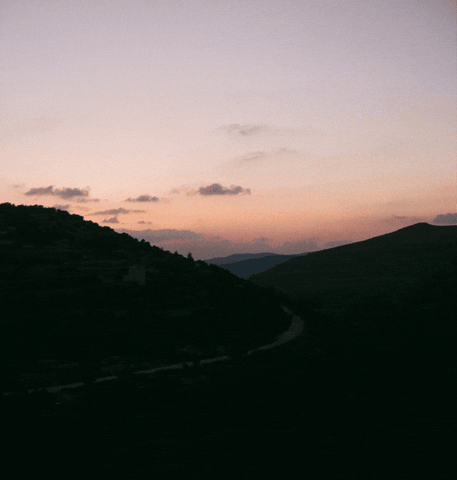
It’s a cool area – there’s no cars, no traffic. It’s so quiet. You can hear the noises of the birds. I like to come here to relax. It’s like a forest, you know. The good thing is to keep it the way it is, for the birds. Nobody touches it. Nobody destroys the forest; they don’t destroy the land with buildings. When you start building, you kill the forest, you kill the land, so there’s nothing left for the animals. Everything is gone for them, so they will start to leave, to go to another area. Look around you: the whole town is very small, right? Everybody’s building, building, building. Some people have some land around their houses, but it’s not that big, you know. Sometimes you need someplace to go if you feel like you don’t want to see anybody, or just to sit alone. That’s the cool thing here: you have nobody here bothering you.
In the night, at sunset, it’s very beautiful. Maybe we’ll see it. Behind the mountain, it’s all red. A few minutes and it’s going to change. See how it changes? We have a good community here, you know. We know one another over here. It’s like a small town. And the culture here is a little bit different – we like to keep connected with one another. We sit together every night; we talk about what’s going on. Yesterday we were here. We had a barbecue and the family sat here all together. It was so fun, so beautiful. When you sit here and nobody bothers you, you don’t feel the time – it runs out very fast, you know. Time moves very fast. When you enjoy your time, you don’t feel it. At the end of the story, you need someplace to relax, you know. Someplace to have… fresh air, let’s say that. – Issa M.
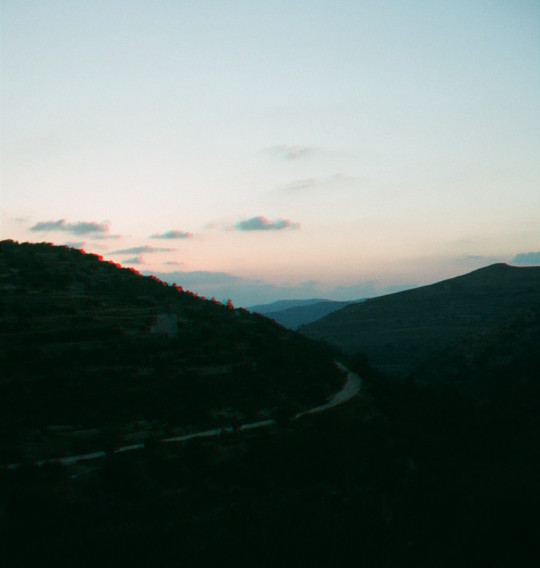
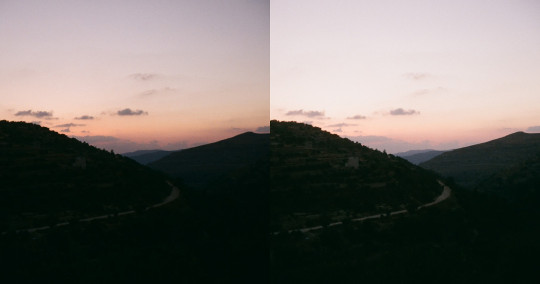
#palestine#west bank#beit jala#wadi makhrour#free palestine#decolonise palestine#stereography#stereoview#3d photo#anaglyph#wigglegram#35mm#oral history
0 notes
Photo
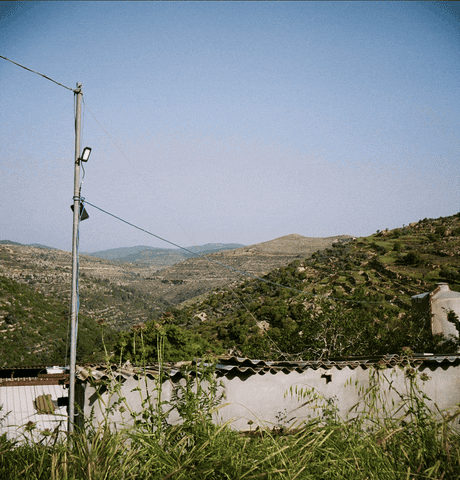
I’m one of those people who loves their land. You know, that piece of land is my joy. I spend most of my time, as a matter of fact, in Al-Makhrour. It’s a beautiful area. I mean, it’s unbelievable. It’s a nice, nice valley. I don’t spend as much time in my house as I spend up there. I enjoy being alone with nature, and that’s about it. When I go up there, I feel really relaxed, like a whole different person. When I’m at home, doing nothing, I feel like I’m tied up or something. So I just crank my engine in my car and go up there. That’s the best way to do it. Just get away from everybody, from all this noise, all the traffic, and stay up there. Even though there isn’t much to do, because as I said, I fixed up my land. But I don’t mind going up there, staying up there, sitting under the tree. You get the fresh air, the view. Honestly, it’s like heaven.
I mean, I was coming back yesterday and I looked at the sun setting down. I said, “God, it’s so beautiful.” As I said, thank God for everything I’ve got. I’m really happy. Fortunately, I know a few people now starting to take care of their land. But we’re talking about the older generation, not the younger one. If they know how to take care of the land, it’ll give them all kinds of things. Like us, this year – you’ve seen how many apricots we’ve got. I mean, we’re talking about more than one tonne of apricots that I’ve picked this year. Why? Because I’m taking care of my land. I grow just about everything. [Our food] is all homemade stuff. It’s 100% organic. It comes out so tasty, it’s beautiful. We live in nature, and it gives us more than we need. So whenever you take care of things, things will take care of you. – Jamal
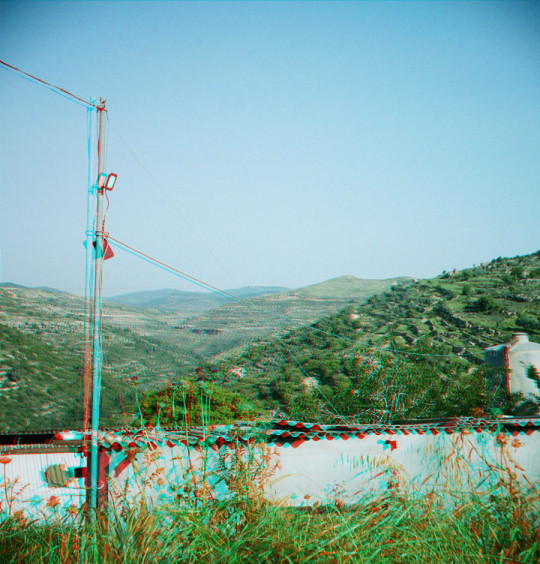

#palestine#west bank#beit jala#wadi makhrour#free palestine#decolonise palestine#stereography#stereoview#3d photo#anaglyph#wigglegram#35mm#oral history
0 notes
Photo
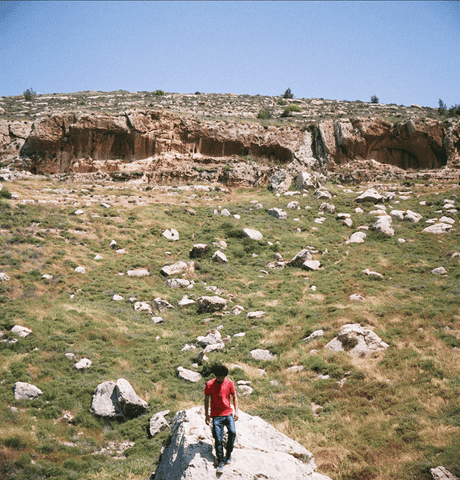
I don’t stay a lot in the village. The days I don’t work, I go out. I go to the evacuated areas. I go with my friends, and we take tents and stay there. So I spend most of my time in nature and I discover places. Mostly, I like sitting in areas like where we’re sitting right now, or other mountain lands, looking at the village. I don’t know, I feel inspiration for work comes [because] I don’t see things in parts. From far away, I start reflecting on things that I didn’t see up close, so I get other ideas. On top of that, the noise – the shouting and people and cars, they ruin my ideas. And there are people sometimes who discourage you when you stay with them. So I like to stay by myself because I feel that I can generate something.
I mean, I spend most of my time going to work and to university, then to the village, so there’ll be a lot of pressure on me. All my thoughts are blocked. But when I go to these kinds of areas, that’s it. Something happens with me and I find solutions, and I even see new work. You’re inspired by nature. I don’t need to be on site to know our situation, because we are living it. When I go to nature, I start thinking about what’s happening to us and why we are like this, and why it’s allowed here, and why it’s forbidden there. And why these areas can’t be approached, why there are borders… I have ideas when I sit with myself. – Mohammad


#palestine#west bank#battir#wadi makhrour#free palestine#decolonise palestine#stereography#stereoview#3d photo#anaglyph#wigglegram#35mm#oral history
0 notes
Photo
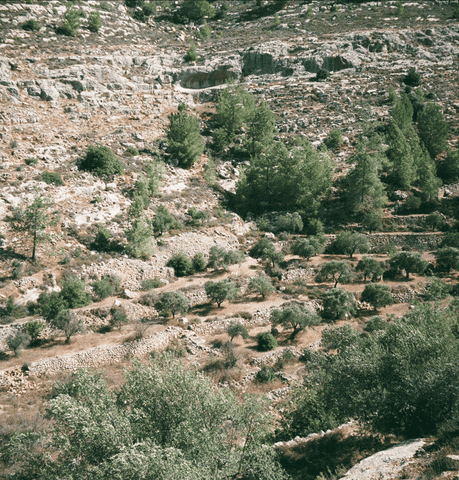
I’m interested in biodiversity. People started to always call me due to my knowledge of the area. I became famous, and today they call me from anywhere: “How can we go to that place?” I give students [on] school trips the basics of the climate and soil, the area’s geography [and] rocks, then we go to the classification of plants and animals in the area, and if there’s a historical landmark, antiquities, or a water spring. Now, there’s the other thing we talk a lot about in nature, which is medicinal plants: their uses, getting to know toxic and non-toxic, and not to eat something in nature without knowing and making sure of it. There’s a proverb that I heard, that seeing settles in the mind more than listening. So when the student goes out seeing the biodiversity with their own eyes, seeing nature, geography, [and] history, it settles in their mind better than listening in a lecture in class.
For example, there’s the maple tree called ‘madrones’ – arbutus in Latin, I think. [It’s] not numerous; it’s threatened with extinction in our area. Its fruits are important for a kind of bird, the jay. All birds eat its fruit, but mostly this bird. It’s its favourite. It’s heritage. When we sit looking at this tree, we tell them its traditional story. The story isn’t real, but a fairy tale, like folklore. The tree colour is distinguished from all the other trees – its trunk is a special red. Colloquially, they call the tree ‘father’s killer’. The story is very long, but most importantly, the summary is that a son sent his father to ask a girl’s hand from [another] clan. When the dad went to take her, he asked her hand for himself. When they came and told him, the son killed his dad. He hit his head against the tree, and he bled on the tree, and the tree became red. How’s the tale?! – Ibrahim M.
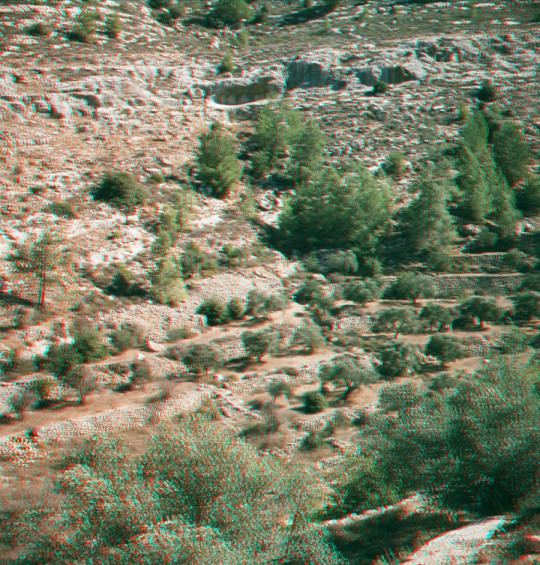
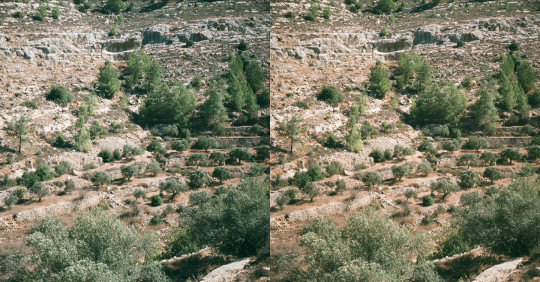
#palestine#west bank#wadi makhrour#world heritage#unesco#free palestine#decolonise palestine#stereography#stereoview#3d photo#anaglyph#wigglegram#35mm#oral history
0 notes
Photo

We are farmers from hundreds of years ago until now. But nothing is in our hands and our government is a poor government. I mean, our President Abbas, he’s a peace man. He doesn’t want to fight. Not like Hamas. If he was like Hamas, we could do what we want. He always says, “We need peace, we need peace, we need peace.” They give him peace. You know, they are always saying Israel will take all of Makhrour. It’s easier for us to keep our land if it’s planted, rather than abandoned. [And if they will take it,] I prefer them to take it when it is repaired and planted. I always try to take [the grandchildren] with me, to teach them. So they come, and sometimes they help. I want them to love the land. [But] I need time to go. If you come and spend [all] your time on the land, it will not give you enough food for your family, you know? This is our problem. – Abu Yousef
It’s a problem, settlement in the West Bank. Many of the compounds and settlements are based on natural reserves. I mean, there inside [Israel] they apply all the systems and laws to nature. But here in the natural reserves… For example, we are next to the reserve of Tamtoum Maountain, 19,000 dunums. Only 4500 dunums were given to the Palestinian Authority and there’s a settlement on the rest. This example is applied to most reserves in the West Bank. [There’s] not much left. Listen, this wall that they put up prevented biodiversity entering these areas here, blocked the animals moving between us and them. I mean, an animal would have to become a bird to come to the spring to drink water and go back. Animals in Jerusalem won’t be able to come to the spring to drink if they make the wall next to Battir! Nature doesn’t know borders. – Ibrahim M.


#palestine#west bank#battir#wadi makhrour#free palestine#decolonise palestine#stereoscopic#stereoview#stereography#3d photo#anaglyph#wigglegram#35mm#oral history
1 note
·
View note
Photo

I’m in between. If [World Heritage status] will prevent Al-Makhrour from being confiscated, it’s OK. Now it’s agricultural land, [so it’s] OK. But in the future, in Beit Jala, there will be no land. So because of that, when they held the meeting here, I refused. A lot of people, when they understood what was going to happen, they refused. What about our future? I prevent the wall, but at the same time, it’s now under UNESCO control. So I’m in between two fires. The land is in my name; it’s for me – but in reality, it’s not. I can’t do anything on my land until I get permission from UNESCO. Until now, there is nothing [happening] in reality.
Just announcing that it’s cultural heritage. Let our lands come back to us, without any limitations. Not from the occupation, not from UNESCO. It’s our property, not theirs. So I’m free to do what I want on my property, until I do something that will affect you or others badly. So if I’m not approaching that, I’m free to do whatever I want. [If] there is life in that area, I think maybe it will help prevent it from being confiscated. It will be a little bit harder for them to [confiscate]. Because a lot of tourists who come there and know the area and know that they are saving that area – they reflect the real picture. – Issa A.


#palestine#west bank#wadi makhrour#free palestine#decolonise palestine#stereoscopic#stereoview#stereography#3d photo#anaglyph#wigglegram#35mm#oral history
0 notes
Photo

The land is going to waste. There was a project from Caritas, and I think it was funded from somewhere in Europe. They spent a lot of money on those projects, you know, so people would take care of their land. They spent something like... I think it was €400,000, to encourage people to take care of their land. But after they finished the project, nobody would even visit their land. A small example: there is a guy who’s got a piece of land which is about 100 metres away from my property, I would say. It was open land; he never took care of it, you know. Whenever olive picking season arrives, he just comes down and picks the fruit, and that’s it. So I stopped once and I asked him, “Why don’t you take care of your land?” “Ah, I don’t have time.” “What the hell are you doing?” “Oh, I’m busy, I’m busy, I’m busy.”
When the Caritas project came over and fixed up his land, he planted a few trees. And that was it! Now if you go by his property, the grass is about 60 or 70 centimetres high. I mean, a small flame would probably torch the whole place. And that’s real sad. The Ministry of Agriculture in our area promised five solar panels, but the people who are taking care of properties, they don’t get anything. I mean, if you’ve got somebody who’s willing to help you out, and pay quite a bit of money to take care of your land, why can’t you take care of it? That’s what pisses me off, to be honest with you. Sometimes it really gets to me, as a person. Because when I see my property is really nice and all the properties around it look like hell, it makes me feel bad. But I mind my own business. I take care of my land; that’s all that matters to me. – Jamal


#palestine#west bank#wadi makhrour#free palestine#decolonise palestine#stereoscopic#stereoview#stereography#3d photo#anaglyph#wigglegram#35mm#oral history
0 notes
Photo

Well, let’s put it this way: I hate to say this, but a lot of people don’t appreciate land. And that’s the difference between us and the Israelis. For us Palestinians… It’s very bad to say it, and I’m really sorry to say it, but not a lot of people are taking care of their land. And I think that Israeli eyes are always looking at those properties that don’t see anybody working. So that gives them the chance to take over or buy them out. It’s miserable. There is some kind of organisation that’s looking out for these properties. It’s a Jewish-Israeli organisation that, whenever they find out that nobody’s taking care of that land, they take over. So there is that organisation that’s running after these abandoned properties. You know, the owners are probably overseas, so they forgot about their land. Some of them, they’ve got a few hundred metres [and] they come back, and they just sell it.
They don’t care who they sell it to – they just want to take the money and get the hell out of here. So that opens up the chance for Israel to take over. I mean, we’ve got cameras, you know. They’re all targeting our area to see what’s going on. I know that Israel is interested in the Makhrour area. UNESCO probably could do something about it, but I wouldn’t bet on it, to be honest with you. They might pressure, but it won’t help much. Israel is above international law. Even if the whole world decided to protect that area, they wouldn’t succeed. The one thing that I would say, to protect the land from the occupation, is just, “Take care of your land.” That’s about it. I would encourage everybody, if they want to keep their land, just [to] work on it. As long as they see that there’s someone who’s taking care of the land, they won’t dare to come down and take over. – Jamal


#palestine#west bank#wadi makhrour#free palestine#decolonise palestine#stereoscopic#stereoview#stereography#3d photo#anaglyph#wigglegram#35mm#oral history
0 notes
Photo

Humanity’s abuses to nature are increasing. Like fire, throwing trash, non-compliance to trails, cooked leftovers – which is trash, too. Also, there’s the fire, the flame igniting the protected areas. Another thing: in the past, Al-Makhrour was full of gazelles. Now, as there are many people coming and going, there aren’t, or they’re rare. I mean, you must go at 5 or 6am in order to see them. They escape because there are too many people. I mean, humanity passed our limits and got involved in animals’ seclusion in the forest. They’re carrying musical instruments and telephones, and they’re shouting. I mean, there’s no calm; there’s no respect for the environment. They don’t behave with nature as a temporary guest who is entering and leaving. So animals, even birds escape. – Ibrahim M.
You see out on the trailway there are places for garbage disposal. Plus, the guide collects garbage and puts it in a specific corner, and the municipality comes every week and takes garbage from the area. And fire doesn’t affect the area. On the contrary, it even strengthens the land. Coal makes fertiliser for land. Peel and lemon and fruit decompose and become part of nature. So we harm nothing in nature. The area isn’t clean, whether you litter or not. I mean, when you go to any other area, you see that the land is clear, the street is clean. If you throw a piece of paper, it will be obvious. [The locals] don’t leave garbage. I mean, they consider it their land. They keep the area clean. Maybe when a stranger comes, OK, they throw their garbage and that’s it. They’re not coming back again. – Mohammad


#palestine#west bank#wadi makhrour#free palestine#decolonise palestine#stereoscopic#stereoview#stereography#3d photo#anaglyph#wigglegram#35mm#oral history
0 notes
Photo

I want to ask a question. Are [tourists] taught the correct point of view, or the Israeli point of view? There are things that [Israel] deletes because they talk about the truth. That’s why the situation is hard. I mean, if a tourist group came and the council hosted them, if they made them food that we make, [like] mansaf, then got them out with someone… Take them to the Bedouin’s olive; walk with them in the streets. Show them the old city – it’s visible from here. Or go down to Al Haniya spring, really wonderful. I don’t know, I think talking isn’t useful. I think reality is what makes one remember. If they come here and we host them well, showing the things we have here, it stays in their minds. If you see and photograph and so on, it stays in your mind. Even if you forget, when you see the pictures, you remember: “I saw.”
But if I [just] tell you… I mean, we like to show the reality: how we live, that Israel oppresses us. We want [people] to see what Israel does to us, that we’re holding on in our homes. [But also] the plants and trees, and what varieties we have. And add to this all the new building that we’re doing, as the foreigners do. I mean, we have brains to build. They think that we’re like from old times, that we have sheep we run after. I mean, we [do] have people that have sheep and the like. There was life in the old days. There’s something called a castle, built of old rocks. People used to go out in summer, sit in it, stroll, stay up and sleep. There was life. This life was cut out for a while. They try to get back to this life because it’s a wonderful area. – Abu Fadi


#palestine#west bank#wadi makhrour#al walaja#beit jala#free palestine#decolonise palestine#stereoscopic#stereoview#stereography#3d photo#anaglyph#wigglegram#35mm#oral history
0 notes
Photo

[Battir is] a very calm area, so problems don’t occur here. I mean, it’s not like Bethlehem or the camps. A lot of Jewish-Israelis come along the path [and] we don’t have someone stand in their way or stop them. I mean, we aren’t concerned with religion; our issue is Zionism. Like when a dog attacked the Israelis. We were walking on the path, from Beit Jala to Battir. Our dogs were playing together. This was the first time they met each other, [but it’s] normal, no problem. There was an Israeli who passed next to us. Their dog didn’t let any dog play with it, or any person touch it – only its owners, the Israelis. You even feel like their dogs are racist, too. My dog is young and wasn’t paying a lot of attention. My dog went to [their dog, and] it attacked and bit.
I took [my dog] and kept it away. Khader’s dog is big. The other dog wanted to attack and so, [because] Khader’s dog was afraid, it bit and tore it up. Then we separated them from each other – and they told us to get away, out of the land. Umm, that’s enough. Khader even wanted to apologise to the Israeli and tell her it wasn’t intentional. [But] she told him, “No, you get away.” They wanted to get us out from the land where we were. They told us, “Go.” But we stood in their way again and told them, “You go.” I mean, we’re sitting here. This is our land. We’re not leaving it. “It’s you who came in our way. You go.” And they took themselves and went. – Mohammad


#palestine#west bank#battir#beit jala#wadi makhrour#free palestine#decolonise palestine#stereoscopic#stereoview#stereography#3d photo#anaglyph#wigglegram#35mm#oral history
0 notes
Photo

[Tourism development] would be a great idea, if we do it right. If they’re going to allow people to start building back there, they’re going to spoil the whole area. Some people came in once when I bought the property, and they told me, “Hey, listen, you’ve got a real nice piece of land, it’s level… You should have some kind of project on it.” I said, “What kind of project are we talking about?” “Oh, swimming pools, and...” I said, “No, no, no, no, no.” I’m fine with the way it is right now. We need some nature, which there isn’t much left of. I encourage [tourism] because it provides more money to invest in the Makhrour area. That’s the only area of open land that’s left, you know, all over Beit Jala and Bethlehem.
I mean, look at this mountain: we used to sit in the front yard of the old house here, and we could see the deer jumping all over the rocks. That was about thirty years ago. Now, as you see, it’s too crowded. So if we encourage tourism, absolutely, that will provide some money for Wadi Makhrour. But we have to know how to do it, OK? The other day I was going down to Al-Makhrour, and I saw a flock of those settlers walking down through people’s land. So I encourage tourism, but to a certain limit. It’s a beautiful area, but as I said, we need the right management, and we need some people to start taking care of their land. – Jamal


#palestine#west bank#beit jala#wadi makhrour#free palestine#decolonise palestine#stereoscopic#stereoview#stereography#3d photo#anaglyph#wigglegram#35mm#oral history
0 notes
Photo

They want to do something in Al-Makhrour; it seems that we’re concentrating on Al-Makhrour. It’s a beautiful agricultural area, a wonderful area to stroll. Suitable for everything, I mean. That’s why it’s important. It needs work. It needs care. It’s not enough now with a restaurant or two, or landowners visiting. There must be activities, like summer camps, cultural festivals, heritage. I mean, attract people to this area so that there’s always life in it. Maybe there should be support for landowners so that they preserve it. And of course, a permit from the Israeli side. The main obstacle is Israel. In the current situation, tourism is local. Now when tourists come from abroad, they tell them, for example: “If you go to Bethlehem, those Arabs will slaughter you! No, you come sleep in Jerusalem.” So they try to provoke against Palestinian tourism. [Um Fadi: Yes, “Don’t drink the water;” “Don’t go to restaurants.”
The problem is that all lands, whether in Al-Walaja, in Al-Makhrour [or] in Battir… All of them are private properties. So if I have a piece of land and I’m thinking of making a project, I can’t afford to. I depend on my neighbour: maybe my neighbour has money [but] maybe my location is better, right? So a big institution is needed, that knows the most appropriate for the topic.] Movement on Al-Makhrour, it needs effort; it needs cooperation. I mean, if we wanted to talk about our people in the Palestinian Authority: [we need] support from outside that doesn’t enter the hands of people living here. Support them in work, without handing them money. Because whenever money comes, in the end, there is no work. If we had to give it to the Authority, it would get lost without anything being done. – Abu Fadi


#palestine#west bank#wadi makhrour#free palestine#decolonise palestine#stereoscopic#stereoview#stereography#3d photo#anaglyph#wigglegram#35mm#oral history
0 notes
Photo

In the valley, most of the tourism relies on the trail. Hikers come through Beit Jala to Battir. Some of them start from Battir and come back to Beit Jala. Those who know, people who like to do hiking, they come and do it. It’s based on initiatives by some locals, some institutions who are interested in tourism. But there’s no strategy to motivate or promote tourism for this area. So far, the estimated number of visitors who pass through this trail is about 500 per week. We’ll try to encourage people to do something more: to take more initiatives to increase the number of visitors, but also to make different kinds of activities to benefit from the nature.
[This is] so the visitor doesn’t only come and walk the trail and go back. We will work on having a more systematic, organised programme that will include the communities themselves. Maybe the visitors come [and] do the hike, but also stay the whole day in Battir, or Beit Jala, or Al-Walaja, when they have other things to do. Like visiting a museum, or having lunch – having some traditional or organic food, something like that. [We are] trying to link the different components: of agriculture [and] natural, organic food with a museum, with nature, with economic benefit. Getting them all together, in a more organised way, this is our objective. – Rami


#palestine#west bank#beit jala#battir#wadi makhrour#free palestine#decolonise palestine#stereoscopic#stereoview#stereography#3d photo#anaglyph#wigglegram#35mm#oral history
0 notes
Photo

Since a long time ago – more than one grandparents’ [generation ago]: two, three, or more – because it's mountainous, around every ten metres they built a terrace. This area becomes flat, so you can grow on it. This area here is mostly green. It needs daily care. There are channels: the principle one [made of] concrete and the second [of] earth. It depends on the level; you follow the level. If I want to shift [water] from one level to another, it comes down to the level of the land. But it doesn’t come down strong, because this sweeps the soil. It flows bit by bit, slowly. The land that’s under the pond, I water it either from the spring, or from the pond. But the one above [the pond], how can I water it? I can water it only from the spring area. This is why during the day, the water descending from the spring is distributed by hour.
Previously, before people had watches on their wrists – seventy years ago or something like this – the water coming down from the spring was distributed according to shadow. I mean, [when] shadow arrived at a certain area, the proportion ended. Spaces aren’t large, but productive. You find a piece of land is around 100 square metres. There is a production possibility if you use it properly. It makes up my family’s food basket. I mean, there are ten varieties of vegetables planted in it. I go down with the basket [and] I find zucchini, I find cucumber, I find eggplants, I find mint, I find parsley, jute, onions. The main crop in Battir is eggplants. They even call it ‘the Battiri’. Everything that comes to your mind, we plant it. Seasonal vegetables: in winter something, and in summer something else. The family eats from this [and] maybe with the surplus you feed your neighbours, your friends. – Abu Wisam


#palestine#west bank#battir#wadi makhrour#free palestine#decolonise palestine#stereography#stereoscopic#stereoview#3d photo#wigglegram#anaglyph#35mm#35mm film#35mm photography#oral history
0 notes